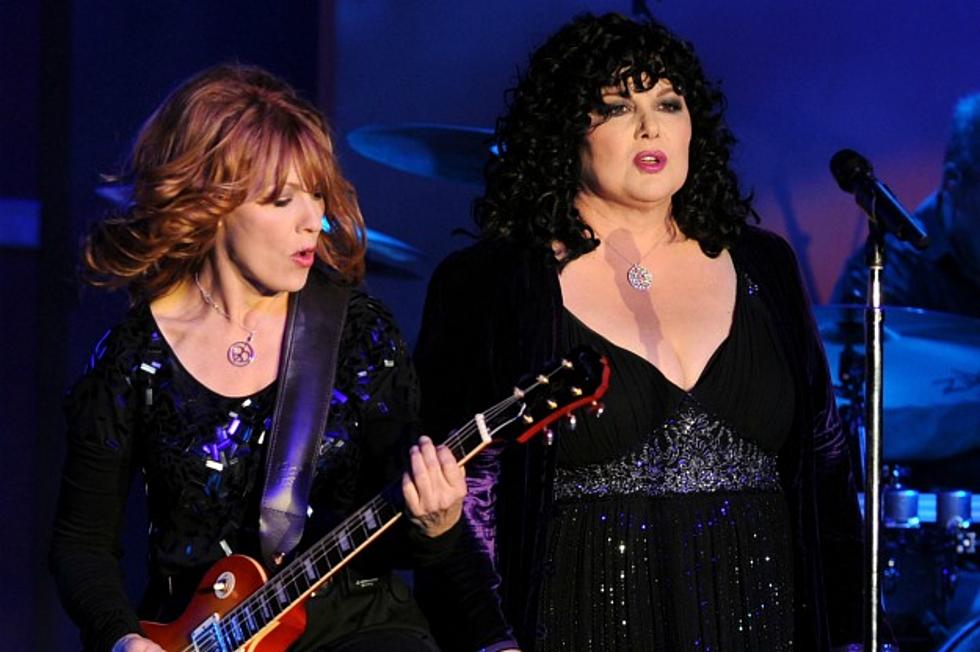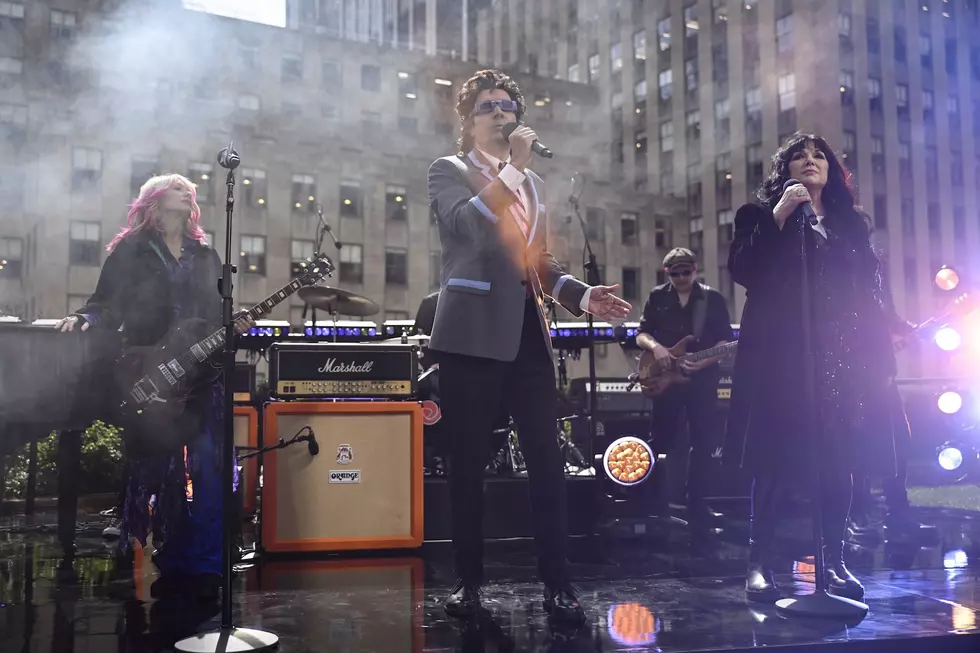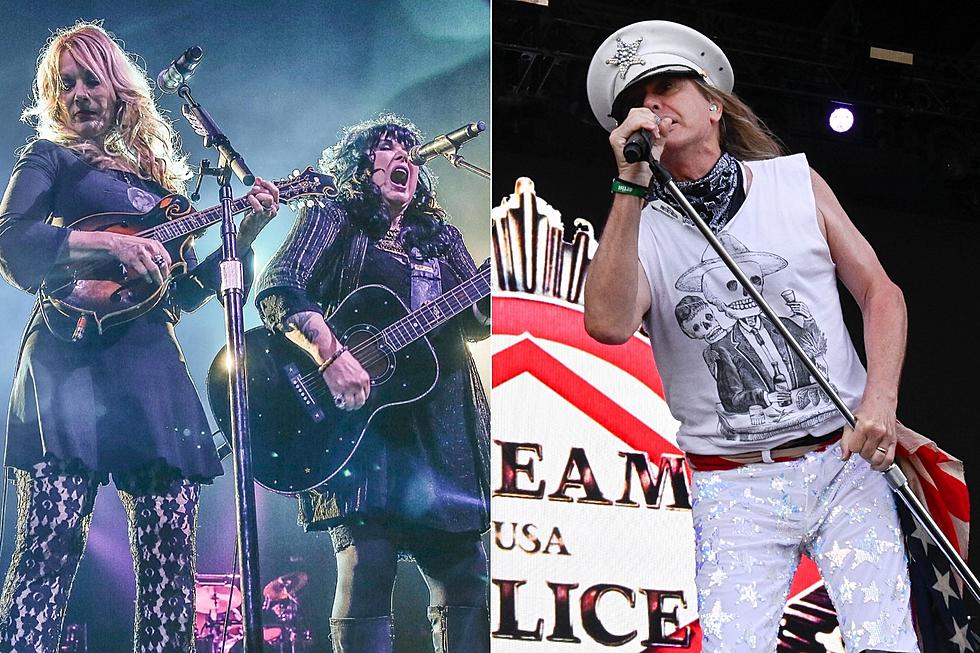
Heart’s Ann And Nancy Wilson Explain How The ‘Strange Euphoria’ Box Set Reveals Their Musical Duality
On June 5, Heart are releasing their first box set, 'Strange Euphoria.' The three-CD collection, which was personally curated by Ann and Nancy Wilson, spans the band's entire career—from their first recorded song, released under the moniker Ann Wilson & The Daybreaks, to songs from their latest album, 2010's 'Red Velvet Car.' Besides this music, 'Strange Euphoria' comes with a live DVD (a 1976 concert, which originally aired on public television) and extensive, personal liner notes with insights into each song from the Wilson sisters. Last week, Ann and Nancy Wilson called in from Los Angeles to discuss how 'Strange Euphoria' came about, the ongoing duality within Heart's music and what working with Led Zeppelin's John Paul Jones meant to them.
'Strange Euphoria' is a formidable collection. What was your process choosing all of the songs? How long did it take you guys?
Ann Wilson: You know, we’ve been wanting to put a box set out for many years. When it became a reality...we have a couple of guys that have worked with us for a long time on archival stuff and we worked with them on a big huge master list and then kind of narrowed it down. It wasn’t easy.
Nancy Wilson: It was about 10 years ago that we had started a box set with Al Q. [Al Quaglieri] at Sony, and then it sort of went by the wayside, but he kept all of the materials we’d put together thus far. So when it came back around to do it again, some of it was already pretty much put in place. We went back and culled through that even more and found other new stuff and crazy rarities. There’s a variety show of interesting artifacts in there.
Was there anything you guys found that you had forgotten about—or anything that really surprised you, where you were like, “Oh, I forgot I did this!”
NW: There were some demos that were like, “Oh wow, remember that?” Because when the songs don’t get on the album all of the time, you can rediscover them like they’re new songs again. It was like, “Why didn’t this get on the album? This was a really cool song!” So yeah, just a lot of surprises.
Yeah—some of the songs on 'Strange Euphoria,' I also couldn't believe they didn't make an album. They’re so interesting and fully formed.
AW: Well, obviously, there was a different kind of philosophic thing going on for Heart during the times that those songs were written. Other people had other ideas that overruled ours. Which is hard to believe when I just say it now, because we wouldn’t let that happen now. It’s so great to hear all of this backlog of stuff. Because we never stopped writing. We just were diligent; we just kept it up and kept it up and just kept piling them up.
NW: We were never in step with what was going on musically, mainly moreso even in the '80s. We were doing weird stuff that was just off the beaten track. The '80s was an interesting, confining time for songwriters, so we were just sort of riffing in our own language, off to the side. And a lot of that stuff sounds pretty good now.
It's like, “Hey, we did have something; we were on the right track then, no thanks to anyone else!”
NW: Yeah, it just wasn’t the style at the time.
With the personal liner notes and how you curated the set, 'Strange Euphoria' feels a lot more personal and intimate than most box sets. This one really does feel like a gift to your fans.
AW: I don’t think we really had any idea of putting together another compilation, because there a lot of those out now. So this is really supposed to be something that you can’t find anywhere else.
NW: That’s right. Some of the stuff that I never thought would see the light of day, like some of the comedy stuff—like ‘Boppy’s Back,’ the faux folk singer’s song! It’s pretty hysterical to have that out there.
In the liner notes, you mention a lot of influences that people might not realize Heart has, such as blues, R&B and Elton John. There is still a lot to discover about Heart. Not many bands who have been around as long as you have can say that.
NW: True.
AW: That’s true.
NW: And we sort of have this comic side as well that is just bubbling under, most of the time. People can discover that we’re not just self-absorbed, serious people. We’re kind of more wacky as well as romantic and serious and rockin’. There’s a lot of personality going on through the arc of this whole career. That’s why ‘Strange Euphoria,’ I think, is the right title.
AW: I agree. I think that songs like that and ‘Boppy’s Back’ and some of the more outside songs really show our humanity more.
Sometimes, with female musicians especially, people only want them to show one side. And if they are multi-dimensional, people have a hard time with that.
NW: That’s right. A lot of times women are pigeonholed. [And] if you have a sense of humor or if you’re trying to show humor, it’s misconstrued as sarcasm or bitchiness. That’s obviously not what the stuff on the box set is like. It’s just kind of an interesting take on it, because women should be able to just be as goofy or as intellectual or as bitchy as they really want to!
Nancy, in the liner notes, you frequently mentioned the songs that were written on your farm. The way you describe writing them, you can just tell how much fondness you have for those times. What do those songwriting sessions like that mean to you guys as musicians?
NW: Well at that point, I was always the engineer and I had a reel-to-reel, quarter-inch desk, which I almost knew how to use fairly well. So it was just really a sense of super freedom, because being able to tech ourselves, play everything and produce it, record it and at least engineer it all ourselves, usually me and Ann and Sue Ennis, was just a great sense of freedom and empowerment. Nobody was looking over our shoulder going, “Oh, that’s a wimpy ballad -- only chicks would like that.”
AW: Right. Or worse: “Hey, c’mon, you have the obligation to do a bunch of really heavy rock that isn’t really you!” I mean, we’ve had it from both sides before.
You guys do always mention the duality in Heart's music. As you were curating songs for the set, how did you see that duality evolving in your sound?
NW: We have the heavy rock, and we also have the ‘Dog And Butterfly’ album concept. [That] was because of the “dog” side and the “butterfly” side of this band. It’s always been an interesting dichotomy. Because fans usually go, “I like Barry Manilow, because he’s a ballad singer. I like Scorpions, because they rock!” We sort of do a really wide scope between the two and a lot of things in between. So a lot of our fans initially would go, “Why the heck do you do ‘Barracuda'? Why can’t you just do ‘Dog and Butterfly’ all of the time?”
AW: That’s never going to be us. We’re never going to choose one or the other. I think we’re always rebellious. The minute somebody says, “Okay, you have the obligation to rock,” then we’re going to go “No, we want to permission to do a ballad” and then back and forth, you know?
NW: We’re always pushing against the expectations.
AW: Always.
That’s like when you worked with John Paul Jones in the '90s [on the 1995 unplugged live album, 'The Road Home']. The version of ‘Never’ that’s on 'Strange Euphoria' is from those sessions. I can’t believe it’s unreleased.
NW: It’s a really nice version.
AW: That’s the best version, I think!
NW: It’s so easygoing, and [it has] a rootsy, cool, vibe-y thing without quite as much of the produced sound that’s a little dated sometimes now when you hear some of the '80s stuff. But that’s more of a timeless version of that one, that’s a good version of it.
What did working with him at the time mean to you guys?
NW: Oh God, we were in shock that we would get to go and be in a room with him for weeks on end and work with him and play with him and have him arrange string charts for us and do all of that stuff. It was amazing. We were pinching ourselves every day. We’d get in the car and go [screams], you know? It was really dream-come-true kind of stuff.
AW: Yeah, and he was always such a musician on equal terms. He never once came in and went, “Well, you know, I was Led Zeppelin’s bass player and I played all of the strings on ‘Rain Song’ and ‘Stairway to Heaven.’” That’s just not him. He never came from that place at all. Maybe the first couple of days, we had to walk around each other and figure out that we were just all musicians together. Once we accomplished that, we just went about the business of doing music together and hanging out afterward and having a meal and having some wine. It was very cool and relaxing. What a gentleman.
More From Ultimate Classic Rock








